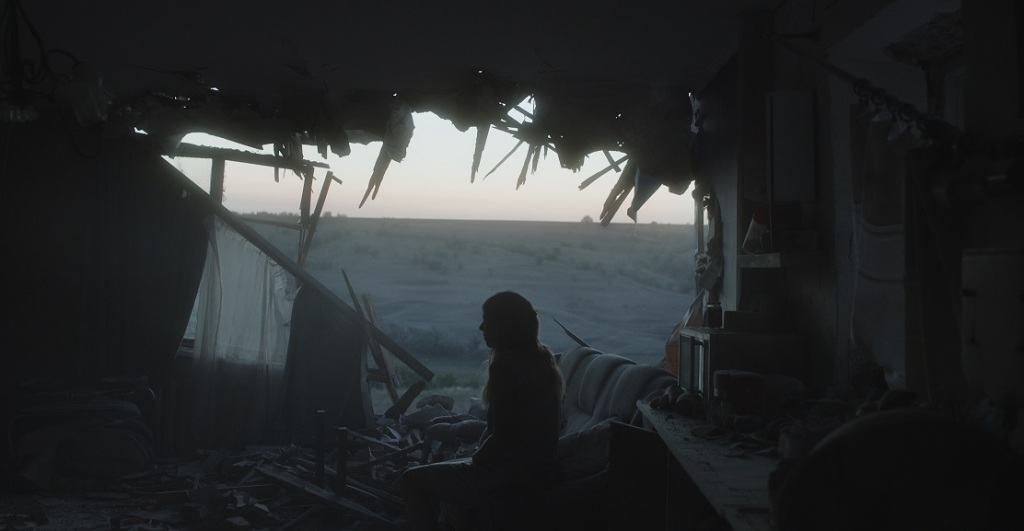Klondike
Required Viewing
Reviewed for Film Factual by Abe Friedtanzer
Director: Maryna Er Gorbach
Writer: Maryna Er Gorbach
Cast: Oxana Cherkashyna, Sergey Shadrin, Oleg Scherbina, Oleg Shevchuk, Artur Aramyan, Evgenij Efremov
Screened at: Critics’ screener, LA, 11/25/22
Opens: November 3rd, 2022 (Ukraine)
The idea that history repeats itself is rarely invoked as an example of something good. Instead, it’s usually that an unfortunate event or trend has been permitted to happen once again despite the foreknowledge that society should have had to stop it ahead of time. Ukraine’s official Oscar submission for Best International Feature is an example of that miserable truth, showcasing the harrowing experiences of everyday Ukrainians whose lives are destroyed by the incursion of Russian forces, set in 2014 but all too relevant today.
Klondike opens on the heavily pregnant Irka (Oksana Cherkashyna) and her husband Tolik (Serhi Shadrin). Their hopes of an easy and peaceful delivery are brutally disrupted by an explosion that takes down a large part of their home. As they recover and try to restore walls and electricity, they find Russian separatists passing by and demanding resources. Irka’s brother Yaryk (Oleh Shcherbyna) pushes Tolik to leave and bring his wife to safety away from where they are, but Irka is determined to stay where she is and not to let anyone tell her that she can no longer live in her own home.
This film’s catalytic event is the real-life shooting down of Malaysia Airlines Flight 17 by Russian forces. Yet there’s absolutely nothing cinematic, and rightfully so, about that fatal crash that claimed the lives of all on board. Instead, it’s a disaster that takes place very close to Irka and Tolik’s home and which has devastating consequences for all in its vicinity. It’s impossible to identify anything from the wreckage, and those who do visit the scene do not have good intentions, eager only to find any culprits potentially responsible rather than to honor the lives lost.
As a whole, Klondike is particularly plain and simple. It feels at times almost like a play, but one that is enhanced by its bleak, grim backdrops that show just how little there is around this one crumbling house. The ease with which outsiders could come in to what remains of it is also alarming, and this film helps to convey that need people feel to stay in their homes when all signs point to an unsustainable future and the need to pursue an immediate escape, if such a thing were even possible to achieve.
Due to its setting and the events surrounding it, there’s little joy to be found in this film. While that is surely accurate and there shouldn’t be any artificial addition of happiness, it does present a bleak picture which is daunting to engage with and far from inviting. That starkness works to the film’s advantage if audiences are willing to enter that space of misery and to find any brief release in small moments like when Irka is able to sit and watch television to forget for just a short time all that is going on around her.
The concept that less is more absolutely applies to this film, since the presence of elaborate sets or visual effects would have been distracting from an inherently human story, one that shows how people can change and turn on each other when the circumstances around them mold behavior into something that looks very different and isn’t held to the same standards. The performances from Shadrin and Shcherbyna are similarly without fanfare, expressive mostly of the anger and fear that come with being unable to control what is going on and being forced to make difficult decisions for survival. Cherkashyna is the film’s beating heart, and her strong will as she contends with imminently giving birth in a world deteriorating fast around her is gripping. Klondike’s themes are potent, but ultimately its disturbing and upsetting qualities make it challenging to permeate.
100 minutes
Story – B
Acting – B+
Technical – B
Overall – B


[…] of unrest and conflict. Ukraine’s official Oscar submission for Best International Feature, Klondike, also deals with the physical destruction and emotional catastrophes inflicted by repeated […]
LikeLike